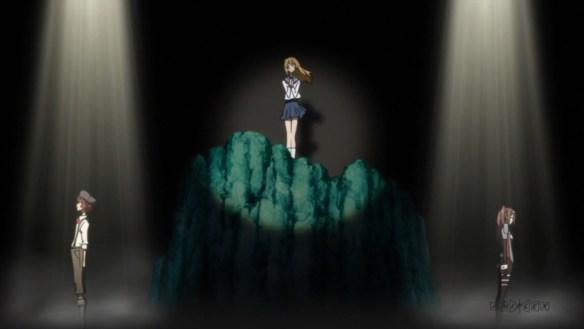Hello folks, and welcome back to Wrong Every Time. Today I am thrilled to be returning to Star Driver, as we charge forward into what I have to assume is the show’s endgame. With Ko and Madoka having abandoned their pursuit of the Ginga Bishonen, we’re basically out of secondary conflicts at this point; all that’s left is the school play and Tokio’s machinations, meaning I have every expectation that we’re in for a school festival episode.
Taking one final break before the big action climax seems more than fine by me. Both Igarashi and Enokido are in their element spearheading comedy; the two have been collaborating on delightful goofiness ever since their Sailor Moon days, and given his long stewardship of the Doremi franchise, I’ve likely laughed at more Igarashi nonsense than any other artist in the industry. In their hands, irreverent school adventures and ludicrous expressions aren’t just a break from the action, they’re often a vehicle for characterization, revealing as much or even more about their casts as their actions under pressure. With that play and its long-anticipated kiss scene approaching, I’m guessing we’re in for an episode that revels in school shenanigans while simultaneously harnessing them as a vehicle to explore Wako’s hesitant, shifting emotions. Let’s find out!
Episode 22
“Now the world is about to be reborn.” We open directly on the play itself, as Wako offers a song of flowers blooming and the world awakening – the same conflation of sexual awakening and apocalypse that defines the show as a whole. So presumably this whole play will serve as an elaboration on or mirror for the show’s central metaphor – yeah, we’re in deep Enokido territory here. Any veteran of Utena must surely be well acquainted with its frequent “play within a play” interludes – a technique that has been used to elucidate truths the actual players are denying since at least Hamlet, though I’m sure there are earlier precedents
Sarina addresses Takuto as “Marc.” He looks pretty adorable in his newsboy cap and suspenders
Meanwhile, Sarina is dressed in some sort of bizarre jumpsuit, and Takuto addresses her as “the avatar of the Great Squid King.” Oh shit, are we expanding on Tokio’s fairytale? I recall “killing the squid king” was his stand-in for claiming great power, but that it required the sacrifice of a maiden – basically another metaphor for the island’s Cybody transaction
Sarina states that Marc is in love with Crace, Wako’s character, though Marc doesn’t seem to know her name
“Can you see her?” “I’m able to see her.” So Wako’s character is apparently ephemeral, of uncertain substance, which makes sense for this portrayal of the liminal age
“I came here to tell you the story of Crace, and of the ship.” Given Tokio also knew this story, I’m guessing this is the legend of the island itself – the origin of this whole Cybody paradigm
“Crace was invisible to the eyes of ordinary people”
“But Crace wasn’t lonely. Why? Because she met Calumna.” Sugata’s character, seemingly playing the same role as he does in real life, the same role his ancestors once performed
Their attire and accessories are purposefully chosen. Sugata’s in a business suit with a briefcase, an adult man who must attend to his professional duties, while Wako is in a school uniform sitting at a bus stop, the young maiden who’s perpetually on the verge of flight
“You must have a special aura of life that no ordinary person has. The radiance of that aura is what’s reflecting me in your eyes.” Even Crace frames herself as an illusion, a distortion of perspective
“I think you’re the first man who’s seen me.” “Then that makes me the happiest man in the world. Because that sweet smile of yours belongs to me alone.” His love is defined by ownership from the start. Women are to be tucked away, available only to their male protectors
“My body is like a mirage.” Crace has no physical substance – she is a figure of longing alone, the desired perfect maiden that cannot be held in the hands. A fate that seems to echo Tokio’s perspective; women he can actually hold are swiftly discarded, he only longs for that retreating, unreachable back. He is always seeking the shrine maiden, but the shrine maiden must be pure – the moment it is claimed, it is no longer the ideal he seeks
“Every morning and night for the rest of my days, I want to gaze upon your smile.” And yet that smile is never enough
“I’m sure that I was born just so I could live this day.” And at the start, Crace is also happy to define herself through Calumna’s happiness
Tiger is our next cast member to appear, realized as a jewel-bearing temptress who questions Calumna’s love
Tiger could apparently see Crace as well
The expression work is top notch for this episode, a welcome priority for a sequence so driven by character acting
“It’s not some radiant aura I possess. It’s eyes of magic.”
“Are you saying you’re a witch?” Sugata immediately brandishes his knife, the symbol of his office. The leader of this island covets shrine maidens but detests witches – once again, women are subjects of worship until the precise moment they are claimed, or express agency
“Every man has at least one knife on him.” The play frames Sugata’s position as simply the way of all men
Tiger introduces herself as “Sayin the Witch,” and her gem as the “Jewel of the Night”
“If you wear this jewel, you can touch Crace’s body.”
God, the character acting is so good this episode! Tiger’s seductive sneer, Sugata’s guileless longing – their “performances” are so good that it’s easy to get caught up in the drama of the play, while also appreciating how the cast members are pushing beyond their comfort zones (or embracing their true desires, in Tiger’s case) in offering these performances
In exchange for the jewel, Sayin desires a ship docked at the north shipyard, an ominous vessel that looks much like some megasized Cybody
In between acts, Takuto spies a girl he knows in the audience, presumably from the mainland
“To his surprise, it turned out to be a ship that could fly.” The ship as realized on-stage is quite different from that momentary vision of a Cybody, further implying that this is a reenactment of the island’s origin story
“I can make this ship fly across the heavens wherever I wish! I’m not the same man I was yesterday!” Enthralled by the freedom offered by this activated Cybody, Calumna immediately forgets his promise, and his lady Crace
“But flying in the sky was taboo on the Fish Planet. The queen resided in a high tower of the castle. And it was taboo for anyone to come near the queen’s room.” Another woman who cannot be touched, only coveted from afar
The queen is played by Jaguar, who’s also having a ton of fun with her role. Sadly, she is assassinated pretty much immediately by Calumna
“Who are you?” “I’m the new king of the Fish Planet.”
“My performance ends here!?” We even get some laughs from the crowd as Jaguar makes her final plea for a bigger role
“The king has to be in the highest place. In other words, whoever can reach this height should be king!” Circular, self-aggrandizing reasoning, which ultimately posits that the desire to conquer and subjugate is its own justification
“He gradually forgot about his love for Crace. Or perhaps by that time, he was unable to see her.” Interesting. So fulfilling his ambition erased the sense of dissatisfaction or longing that allowed him to dream of the shrine maiden? I suppose that fits; the shrine maiden can only exist as longing unfulfilled
“As long as I’ve got this ship, everything the world has to offer me is mine!” But what does the world have to offer you, Calumna? What has your freedom brought you? The dreams we see on this island never seem to extend that far – the horizon is always distant and shimmering, indistinct
“The ship belongs to you? Haven’t you realized it yet? You are the ship now.” A phrasing that also resonates with the progression of the Cybody activation phases – given Madoka’s last transformation, the natural next step would be total integration of the human and Cybody selves
During the intermission, Hanako questions Kate on the story so far. “How tragic, he chose ambition over love. But Class Rep, since you’re so cool-headed, do you find it more convincing to lead such a business-like life?” An interesting jab. Hanako is obviously twisting the knife intentionally, obliquely referring to Kate’s lingering feelings for Sugata, mocking Kate for her superficially cool-headed nature. I’m also intrigued by the choice of “business-like” as a way of describing Calumna’s choices – a phrasing that echoes his costume, implying induction into the world of adults necessarily requires both abandoning romance and entering the corporate sphere
“I think Crace is still happy, regardless.” A response that might be Kate trying to convince herself she’s okay with her own choices, with her inability to truly claim Sugata
The girl from the mainland reveals she actually came to see Wako, because she “wanted to see what kind of girl Takuto fell in love with.” Ah shit, we’re really in it now
And now we get the OP drop. Goddamn!
The menacing robot our heroes face in the OP is the same one that briefly appeared representing Calumna’s ship, confirming its identity as the original, fully integrated Cybody
A slight wardrobe malfunction as Tiger is lowered onto the ship via crane apparatus. They really went all out for this play’s production!
In spite of allegedly being paralyzed by the witch, Calumna swiftly stabs her as well, drawing on the power of the ship to betray his partner
“Die, you damned witch!” Our brief cut of the original story reveals the “witch” to be another person integrated with a Cybody, though this one of the more conventional Cybody size
The witch states that merging with the ship is his punishment for abandoning his love
“Afterwards, Calumna continued to rule as the king of the Fish Planet, but he remained hidden deep within the castle.” So is Calumna still the wielder of that ultimate Cybody?
Sarina states she is one of the “Entropeople,” presumably riffing on entropy, a system’s natural tendency towards disorder and decay. So she is trapped like Calumna, slowly disintegrating over time
They are “a galactic race that has vowed never to use magic.” Perhaps they were the original shepherds of the Cybodies, understanding their power should not be exploited
The cast members to the side reveal that these lines aren’t actually in the script – Sarina appears to actually be controlled by the genuine Entropeople, who seem to be controlling her through our fox mascot character
“Do you carry a knife, just as Calumna did?” Will you wield this power for violence, Takuto?
“My purpose is not to steer the ship, but to see her radiant smile. If I do have a knife, it is only to protect her.”
After the play, Tokio tells Sarina that she “ended it at the right place,” as he is of course incapable of believing that any man could be satisfied with that conclusion, and that any continuation would inevitably result in Takuto’s character embracing Tokio’s own selfishness
Takuto introduces the visitor as his junior high friend Hana Okada. She elects to leave on the last ferry, assured that Takuto has found his direction – that he “hears the soul of the world,” as Takuto’s grandfather once phrased it
And now Tokio’s telling Sarina he’d like to paint her, though she’s fortunately far too smart for that
“Unlike the others, Tauburn is a Cybody created specifically for earthlings. Even we have no idea what it’s capable of.” Sure, just sneak some last-minute alien overseers into our narrative, no problem
We conclude on Kate’s nightly ritual – though this time, Sugata awakes
And Done
Goddamn, what a reveal-stuffed episode! Our drama club’s play turned out to be even more informative than the outright flashback-focused episode, revealing the full origins of the Cybody system while offering an array of delightful performances in the bargain. Apparently Aliens Did It, though of course knowing the alien origins of these Cybodies doesn’t really impact their thematic significance – instead, these final reveals effectively illuminated the darker corners of Star Driver’s central metaphor, articulating a perpetual cycle of men seeking love, but being drawn away by the allure of power once love was in their grasp. I particularly liked how Sarina’s interpretation of this story differed from Tokio’s, offering some damning context for his story of Squid King violence, wherein only through sacrificing the maiden could the hero achieve true freedom. Fables can either explain our world or guide our destiny – let’s hope that Takuto embraces Sarina’s telling, and breaks the cycle at last.
This article was made possible by reader support. Thank you all for all that you do.




